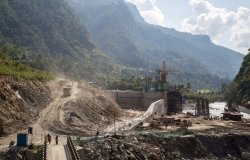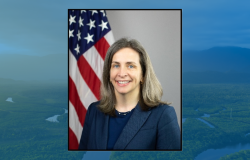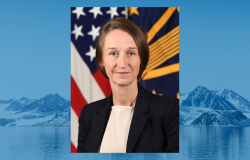Change on Climate Change
"The current attempts to tackle climate change on an international level, undertaken by the United Nations Framework Convention for Climate Change diminishes its own likelihood for success in its attempt to create a sweeping plan for change. A few relatively simple changes, however, could help break the UNFCCC's repetitive cycle of failure that has progressed slowly and accomplished little," writes Ruth Greenspan Bell.
United States President Barack Obama invested four years and his top diplomats in containing Iran’s nuclear capabilities. He did this because an armed Iran is an existential threat to its neighbors, its region, and the world. Obama’s efforts in the talks stand in marked contrast to those geared toward addressing an even bigger and longer-term existential threat—containing climate change. The conditions that allow humans to survive, evolve, and thrive on earth are being compromised; radical changes in the climate promise a very uncertain future.
The current attempts to tackle climate change on an international level, undertaken by the United Nations Framework Convention for Climate Change (UNFCCC), seek to tackle the global threat on a whole. The UNFCCC diminishes its own likelihood for success in its attempt to create a sweeping plan for change. A few relatively simple changes, however, could help break UNFCCC’s repetitive cycle of failure that has progressed slowly and accomplished little.
First, the foreign policy community must take climate change as seriously as it does nuclear threats and deadly wars. This sounds like a no-brainer; U.S. Secretary of State John Kerry has stressed the importance of the issue, mandating that every part of the State Department must make climate change a priority. But seasoned State Department professionals have seen fads come and go. They know which departments have prestige, and which do not; working on climate policy does not help build careers. And if that is true in the United States, imagine the standing provided to this issue in all but the world’s most environmentally conscious countries.
Removing climate change from policy purgatory and stressing the career-making importance of working on the problem in Washington would send a major signal to the world that the United States takes the threat seriously—and would allow policymakers to attract the best-skilled candidates to the cause. There are many ways to signal diplomatic status and urgency. When the president decided to change Washington’s policy toward Cuba, he assigned the task to his innermost circle. Taking a similar approach to climate issues would begin to break the current policy logjam and send reverberations around the world.
Second, the United States must demonstrate that progress is indeed possible. One way is to unbundle the many issues currently subsumed in the UNFCCC and solve what is currently solvable, either within the UNFCCC or in other configurations and venues. This could mean narrowing emissions discussions to the handful of countries that really count or finding a smaller but solvable issue to show progress. Incremental progress has worked in the history of weapons negotiations, where particular issues such as means of verification or banning atmospheric testing were resolved, once the goal of “general and complete disarmament” proved too ambitious. The important result would be defeating the notion that nothing can be resolved unless everything is resolved—and the consequent sense of hopelessness.
GETTING COMMITTED
The P5+1 negotiations with Iran over its nuclear aspirations focused on only one of many issues that separate Iran and the West, which some critics have called a failing. Still, although other issues certainly remain, the negotiation process took a big, contentious issue off the table. As Obama told NPR during an August 2015 interview, “It’s that under any scenario our problems are greatly magnified if in fact Iran also has a nuclear weapon. And, you know, this is a situation of first things first, this deal accomplishes that, and it’s, as a consequence, worthy of support.”
Exactly the same could be said about dangerous greenhouse gas emissions. If an agreement that started the process of reducing emissions went into effect tomorrow, any number of other issues under consideration by the UNFCCC would still need resolution. There is no question, for example, that the world must find a way to ease the challenges faced by the hardest hit and least equipped countries and peoples. The developing world needs the know-how and technology to equip itself against the challenges of climate change. But immediate action would address the underlying problem that creates the other issues they face. Some level of mutual trust and good feeling that would be achieved through one important agreement would also build toward the resolution of other issues.
None of these arguments is revolutionary. In fact, the country commitments that are already being penned ahead of this year’s UNFCCC meetings are in line with these recommendations. The United States is working in various ways with both China and India to develop goals, but efforts with those countries and others on relevant matters of mutual interest could be intensified and accelerated, moving up deadlines for reductions and pushing the development of technology.
On the Iran deal, Obama has said that time will be the ultimate arbiter of its value. It may not accomplish every task required to bring Iran into the international order, but it makes strides that could lead to broader and more comprehensive agreements that could do so. The same could happen for climate change: One strong agreement could set a new precedent for bigger negotiations down the line while reducing one of the world’s largest threats.
The opinions expressed here are solely those of the author.
About the Author

Ruth Greenspan Bell
Visiting Scholar, Environmental Law Institute; Research Associate, Columbia University Business School’s Center for Decision Sciences

Environmental Change and Security Program
The Environmental Change and Security Program (ECSP) explores the connections between environmental change, health, and population dynamics and their links to conflict, human insecurity, and foreign policy. Read more

Global Risk and Resilience Program
The Global Risk and Resilience Program (GRRP) seeks to support the development of inclusive, resilient networks in local communities facing global change. By providing a platform for sharing lessons, mapping knowledge, and linking people and ideas, GRRP and its affiliated programs empower policymakers, practitioners, and community members to participate in the global dialogue on sustainability and resilience. Empowered communities are better able to develop flexible, diverse, and equitable networks of resilience that can improve their health, preserve their natural resources, and build peace between people in a changing world. Read more










